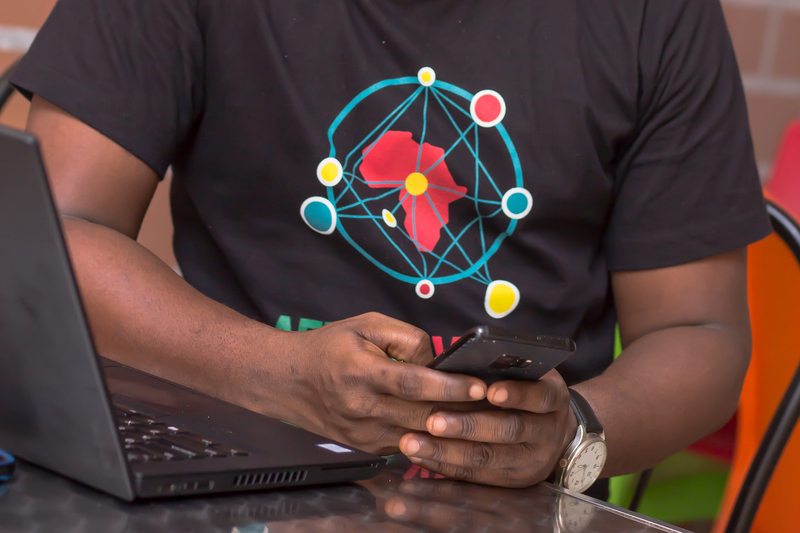Ensuring equitable access to COVID-19 info
11 June 2020 | Story Nadia Krige. Photo Charles Wundengba, Pexels. Read time 7 min.
While reliable communication around COVID-19 is vital to curbing its spread, many people without ready access to data have been excluded from this knowledge – which could be instrumental in saving lives. This inspired Professor Salome Maswime, head of the Division of Global Surgery at the University of Cape Town (UCT), and her team to intervene with accessible digital solutions.
“There is a lot of information available electronically, but most of it can only be accessed if the reader has access to data,” says Maswime. “It’s important that we are part of providing meaningful, reliable solutions that are also affordable for those who need it most.”
While providing low-cost, low-bandwidth digital solutions may seem like an odd fit for the Division of Global Surgery, Maswime explains that it forms a key part of their innovation work.
“With global surgery, we have three arms: education, research and implementation,” she says. “A big part of implementation is practical projects to improve service delivery and health literacy.”
Maswime and her team, in partnership with Impeelo (an innovative company that leverages technology to improve health literacy), have been involved in two important projects to provide those who live in low-bandwidth communities with information that is easy and affordable to access and based on the most recent science.
Simple USSD solution
The first project, active during the initial part of the COVID-19 crisis, took the form of a simple mobile platform that could be accessed easily and without data via a USSD code.
“It’s important that we are part of providing meaningful, reliable solutions that are also affordable for those who need it most.”
Launched at the beginning of April 2020 and active for seven weeks, the platform intended to provide people with the most important information regarding the novel coronavirus and how to protect themselves against infection.
By simply punching in a USSD code on any mobile phone – not necessarily a smartphone – people immediately got information in one of four languages (Afrikaans, isiXhosa, isiZulu or Setswana) without using any data.
Not only was the information inexpensive and easy to access, it was reliable, as all the content had been created by the global surgery team with Associate Professor Sipho Dlamini, from the Division of Infectious Diseases and HIV Medicine at Groote Schuur Hospital, providing oversight and final approval.
The platform is not currently operational, however, as Maswime and her team believe it has had the impact they set out to make. Although, should the need arise for the information to be distributed once more, the team can easily reinstate access.
“After seven weeks, I think people had the basic answers about COVID-19, and so we focused our attention on a second digital project,” says Maswime.
Low-data self-diagnosis
The second project aims to create a digital tool both to help South Africans self-assess their COVID-19 symptoms and to aid government efforts to pinpoint virus hotspots. It’s an ongoing collaboration between the United Nations Institute for Training and Research (UNITAR), the Global Surgery Foundation, the Rali and Makentse Mampeule Foundation, UCT’s Division of Global Surgery, and Slalom Consulting
Apart from helping people to assess their symptoms, the app will also help government pinpoint possible infection hotspots.
Based on a similar set of principles to the USSD solution, it takes the form of a web-based app (covid.za.com) that requires little data to use and is available in the same languages mentioned above.
The app will be rolled out in phases. During the first phase – which has already begun – it’s being offered as a voluntary self-diagnostic tool for those who think they might be infected. Once they complete the questionnaire, the user receives advice on what course of action to take next. At the same time, the information they provide is collected anonymously to help government pinpoint possible infection hotspots.
The app communicates the information it collects (via the questionnaire) to a predictive modelling dashboard that assists authorities in identifying communities with a high prevalence of COVID-19 symptoms and facilitates subsequent testing and treatment.
In South Africa, it will allow:
- Control of the spread of COVID-19 via focused identification and testing
- Effective targeting of limited COVID-19 testing and treatment resources
- Prediction of new in-country spread for early interventions
- Identification of ‘safe zones’ in which the economy can be kick-started
The second phase will invovle a more extensive dashboard and predicative modelling tool that will also collect information from hospitals, pharmacies, other apps and traffic patterns to predict and assess the spread of the virus. It will also as identify where tools and respirators are already in place.
As part of such a large collaboration, with a lot of the work happening with the Global Surgery Foundation at UNITAR’s headquarters in Geneva, Switzerland, UCT’s Division of Global Surgery has played an integral role in making it relevant to its South African target market.
Other African countries are also interested in launching a version of their own.
“Firstly, on a practical note, we translated all the information into the four local languages,” says Maswime. “Secondly, we’ve played quite an important advisory role.
“Sitting in on meetings with the various multi-national stakeholders, I’ve been able to provide a South African perspective.”
Other African countries are also interested in launching a version of their own.
“It’s starting in South Africa, but it could become a part of a multi-national project,” she concludes.
Access the web-based COVID-19 self-evaluation app.
 This work is licensed under a Creative Commons Attribution-NoDerivatives 4.0 International License.
This work is licensed under a Creative Commons Attribution-NoDerivatives 4.0 International License.
Please view the republishing articles page for more information.
Research & innovation





































